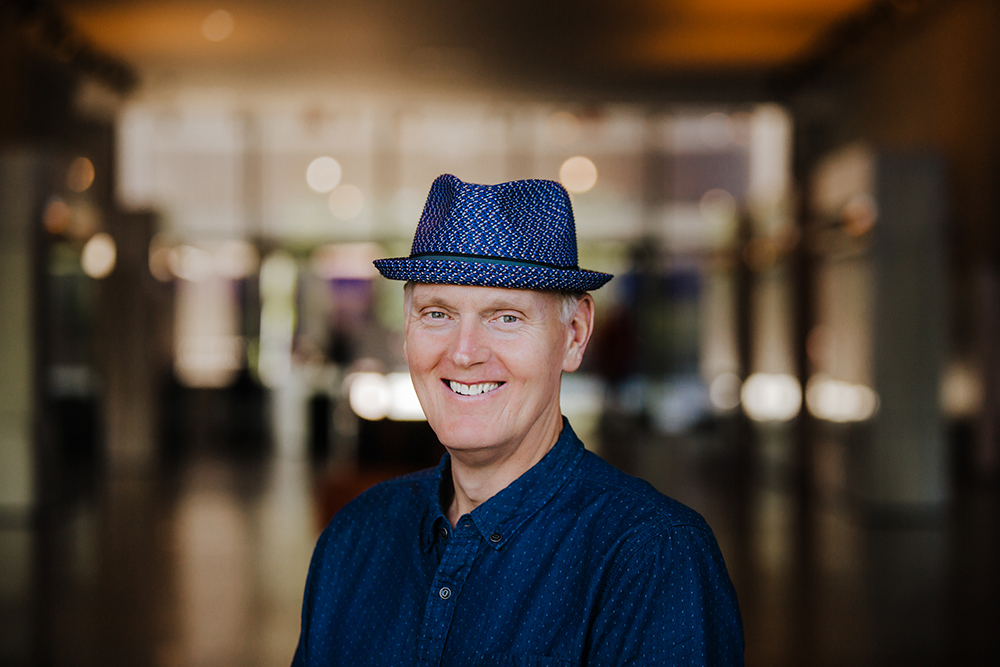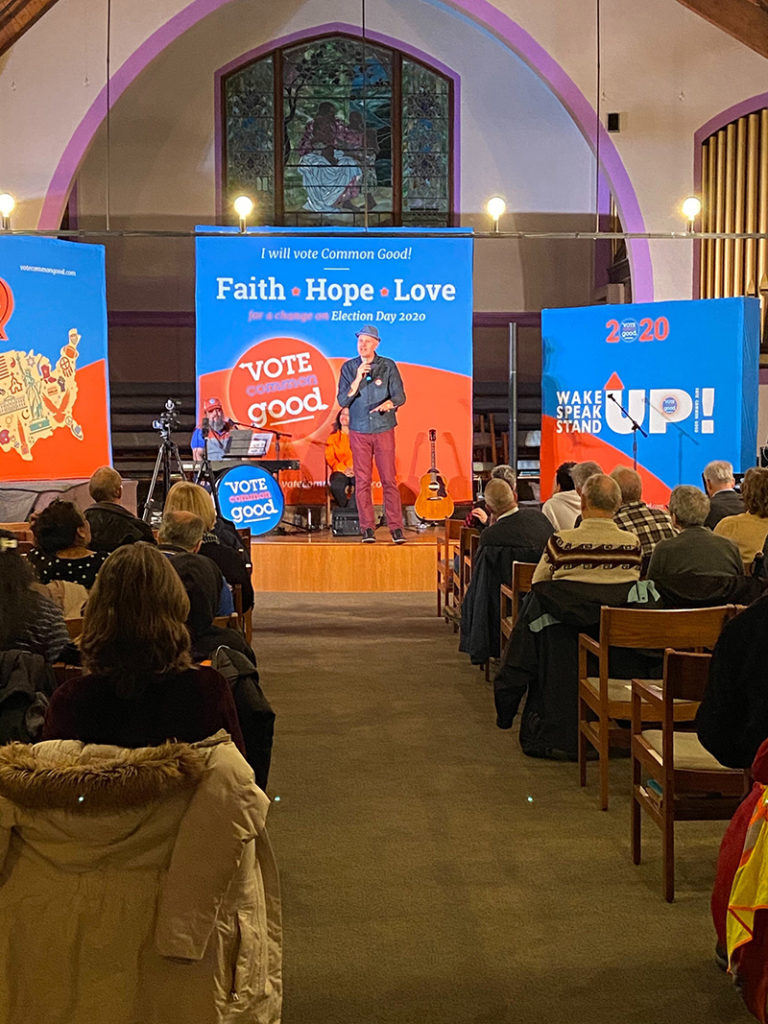
Reaching Evangelicals and Catholics: An Interview with Doug Pagitt of Vote Common Good
by Elizabeth Cutter Evert
Doug Pagitt, a Midwestern Evangelical Pastor and founder of Vote Common Good, describes that in the 2020 election, there was a 5 to 10 percent shift in Evangelical voters away from Republicans. He is confident that an additional 5 to 10 percent are looking for an “exit ramp” from supporting Republicans involved with “policies of division, racism, selfishness, cruelty, and exclusion.
As part of a series of articles for ROOM about bridging divides in the United States, I interviewed him about his work with politicians, as well as Evangelical and Catholic voters, and asked for advice for people on the left who are interested in building inclusive coalitions.
Could you tell me about the work you’re doing with politicians?
Our fundamental work is to help Democratic politicians feel comfortable saying that they want the vote of Evangelicals and Catholics. You would think that’s not a thing you would have to do: Why is that a problem? It’s an amazingly high-cost thing to do. There is so much pressure on Democratic politicians to not cater to the right.
We work with Katie Porter in California: she goes to Evangelical churches all the time. She goes to meet the pastors and hangs out in the lobby and says, “I feel like our groups never get to know each other.” The message comes across: “I see you, and I know this church is in my district.”
But people need help getting there. Toward the end of a speech at one of our events, a candidate described getting to “add something into my speech that I normally don’t say: Growing up, my mom was our pastor.” The crowd warmed up, and she went on and on. Afterward she said, “I’ve been door-knocking through the district here, and I keep meeting all these people at the door that say, ‘I’m a Christian. So I vote for Republicans.’ I haven’t understood that maybe we can change that.” I understand it: “You’ve been an elected representative, and you’ve never told anybody that you grew up with a pastor as a mom.” She wouldn’t have done that if her dad had been a labor organizer or if her mom had been in the Marines. But she had an intuition in Wisconsin that it’s a political liability, as a Democrat, to tell people that your parent was a pastor.
What we have found is even when people are not religious at all—“I never grew up in it, and I’ve watched religion really do some harm”—that’s the thing they can share. Say to people, “Hey, look, I’ve seen that religion can be really harmful, though I’ve also seen the beautiful things it does.” And you know, you’ll have a bunch of Catholics and Evangelicals nodding their heads and going, “Yeah, we know, like, thanks for that. That’s the world we’re living in all the time.”
Our fundamental argument is that Evangelicals, like every other group, don’t need their president to be like them. But they do want their president to like them. If you can give off the attitude that you like them and you respect them, even if you don’t always agree with them, that’s important.

Can you describe the work you do with Catholic and Evangelical voters?
We travel the country, provide resources, and host online communities, but it’s all really in one effort, and that is to help Evangelicals and Catholics who have shaped their understanding of themselves due to their political and religious identity. These are really not religious and theological categories. They’re sociocultural categories: when you meet someone, and they say, “Hey, I’m a Catholic,” you don’t often say to them, “Let’s chat a little about your theology of the Mother Mary,” right? They’re like, “Nah, I don’t actually think about that stuff at all.” Or if you even say, “Well, what parish are you involved in?” they might say, “Oh, I haven’t gone to church for years. But I’m Catholic.” Jewish communities understand this—Muslim communities as well. That’s what’s confusing to a lot of people about Evangelicals particularly. They think it’s religion. I’m not saying these people are not religious—they certainly are. There’s definitely a religious component. But it’s fundamentally a world view or a sociocultural category—a frame of reference to their lives. And we help people detach their political identity from the rest of this cultural shaping.
For a lot of people, being good is an important piece of this. We’re trying to contrast their best goodness with “Why are you doing things where you feel like you’re plugging your nose to still vote for Donald Trump or a Republican person, or where you feel you’re violating your sense of goodness somewhere?”
Another piece is understanding yourself in the milieu of all the changes in culture and society. Where do you find your sense of community?
The third element is that many of these people don’t see themselves fundamentally as political. When you start talking about politics, they’re like, “Hey, man, I’m not political,” and then you drill down a little deeper, and they definitely are, but by their own definition: being a good person who’s in a community is that you put your values higher than just a political identity.
In 2019, we did a series of interviews with Evangelicals, especially white Evangelicals, who voted for Trump in 2016 but were not going to vote for Trump in 2020, primarily because of their faith. One of the pattern pieces was “I’m not political.” And we’d ask them, “Have you ever voted for someone who’s not a Republican?” “No, I’ve never not voted for a Republican, but I’m not political, in that same way.” There’s something where there’s a way to narrate your story, that you’re a good person, you’re doing the heroic thing inside your community, and you’re not being bossed around by the political forces. When someone comes to the realization that any one of those is not actually the heroic piece —
What do you mean by the heroic piece?
Because your religion gives you a narrative of how you’re a good person, then your job is to act in ways that are good when other people are acting in ways that aren’t. So very
often—and this was particular to voting for Donald Trump, but I think it’s broader than that—they would say things like “Look, I didn’t want to vote for Donald Trump. But I couldn’t vote for Hillary Clinton.” Like she had become this image of something so diabolical that they had to do the heroic thing in voting for Donald Trump. The story they had in their heads wasn’t “I did a bad thing voting for Trump.” It was “I did the heroic thing in 2016, because I couldn’t vote for her. But now I’ve realized that really wasn’t the choice I should have made. Now I’m going to do the next heroic thing and not vote for him again.”
People saw themselves as acting heroically on what they knew was good inside a community that gave them meaning. But they broke a community norm. And then they had to navigate. You start looking around at your church or the people in your town or the people at your coffee shop, and you’re like, “Who am I going to talk to? Who do I know?”
We are trying to help people see a community that’s still your people but just voting a different way.
What about abortion?
This has been made into a political issue. It’s a stand-in.
I’ve talked to hundreds of people who say that abortion is the single issue they base their vote on. And I know people who are single-issue voters truly, and abortion is the issue. But they are so rare.
In 2019 to 2020, I asked hundreds of people: “Do a thought experiment with me. If you turn on your radio tomorrow and hear that Joe Biden came out and said, ‘Look, I had an epiphany overnight. The Mother Mary herself visited me, and I’ve changed my view on abortion. I now am a pro-life candidate.” Would you consider voting for him?” To a person they all said no.
In his 2020 sequel to What’s the Matter with Kansas, Thomas Frank says that it’s “a tradition of quasi-aristocratic scorn that has allowed the paranoid right to flower so abundantly.” What do you think about that? Do you think people feel condescended to?
That is the fuel that drives the engine, no doubt about it. It’s the biggest thing. And the advice we give to people in other professions is: Do the best you can to help people not compare one side’s best against the other side’s worst.
Speak of your own limitations and that there are some things the other side gets right.
This piece was condensed from a longer interview. Watch the full conversation, below.
- Elizabeth Cutter Evert, ACSW, is a training and supervising analyst at IPTAR, the Institute for Psychoanalytic Training and Research. She was the founder and director of their On-Site School Program and led the IPTAR Clinical Center for the past eight years. She is on the editorial board of ROOM, where she focuses on working with authors interested in understanding cultural and political divisiveness. She is in private practice in New York City.
-
Email: elizcutterevert@gmail.com
ROOM is entirely dependent upon reader support. Please consider helping ROOM today with a tax-deductible donation. Any amount is deeply appreciated. |

